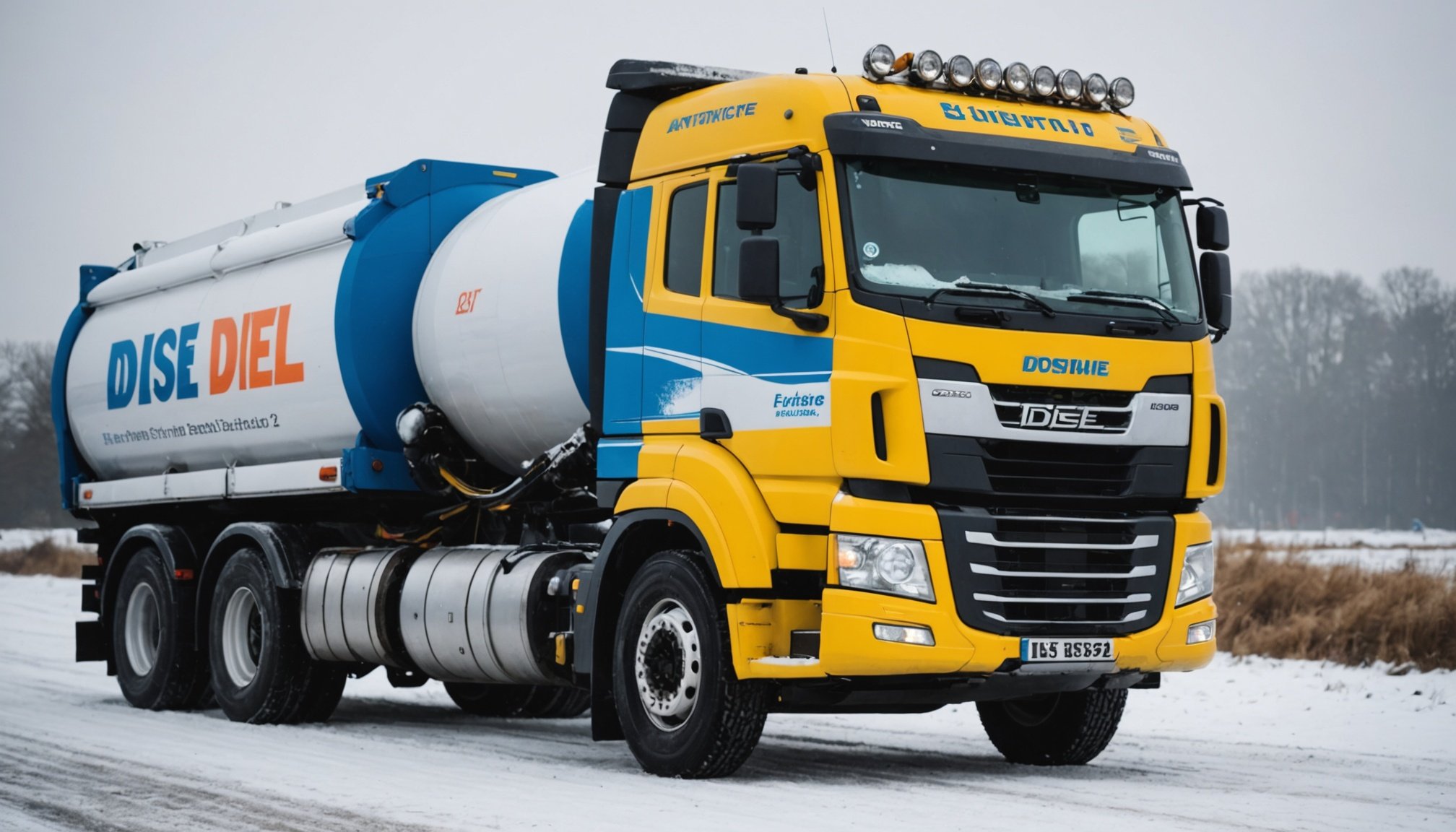The Definitive Handbook for Selecting the Perfect Winter Antifreeze for Your UK Diesel Truck
As the winter months approach, ensuring your diesel truck is well-prepared to handle the cold weather is crucial for its longevity and performance. One of the most critical components in this preparation is the engine coolant, often referred to as antifreeze. In this handbook, we will guide you through the process of selecting and maintaining the perfect winter antifreeze for your UK diesel truck.
Why Antifreeze is Crucial for Your Diesel Engine
Antifreeze, or coolant, plays a vital role in regulating your engine’s temperature, preventing it from both overheating and freezing. Here’s why it’s so important:
In parallel : Ultimate handbook for cleaning and maintaining alloy wheels on your british automobile: a comprehensive step-by-step approach
Preventing Freezing and Overheating
Antifreeze helps maintain the optimal temperature of your engine, ensuring it neither gets too hot nor too cold. This is particularly important in cold weather, as water can freeze and expand, potentially damaging your engine block and other components[1].
Preventing Corrosion
Coolant contains corrosion inhibitors that help protect your engine from rust and corrosion. This is essential for the longevity of your vehicle’s engine and cooling system[1].
Also to see : Key considerations for selecting the perfect aftermarket turbocharger for your uk diesel engine
Maintaining Engine Performance
A well-maintained coolant system ensures your engine runs smoothly and efficiently. This is critical for diesel engines, which are more prone to wear and tear due to their higher compression ratios[5].
Choosing the Right Antifreeze for Your Diesel Truck
Selecting the right antifreeze can be a bit overwhelming, given the various types and brands available. Here are some key factors to consider:
Type of Antifreeze
There are several types of antifreeze, each with its own characteristics:
- Conventional Green Antifreeze: This is the most common type and is suitable for most vehicles. However, it may not provide the same level of protection as newer formulations.
- Organic Acid Technology (OAT) Antifreeze: This type is more advanced and provides better corrosion protection. It is often colored yellow or orange.
- Hybrid Organic Acid Technology (HOAT) Antifreeze: This combines the benefits of conventional and OAT antifreeze and is often used in newer vehicles.
- Violet or G13 Antifreeze: Specifically designed for certain vehicle models, such as Volkswagen, this type offers superior corrosion protection and is often required by the vehicle manufacturer[4].
Compatibility with Your Vehicle
Always refer to your vehicle handbook to ensure the antifreeze you choose is compatible with your diesel truck. Using the wrong type can lead to serious engine damage.
Concentrate vs. Premixed
You can buy antifreeze as a concentrate or premixed with distilled water. Premixed solutions are convenient but may not offer the flexibility of adjusting the water-to-antifreeze ratio according to your needs[1].
How to Mix and Use Antifreeze
Mixing and using antifreeze correctly is crucial for its effectiveness.
Getting the Water-to-Antifreeze Ratio Right
The ratio of distilled water to antifreeze is critical. Most mixing ratios are between 60:40 and 50:50, but this can vary depending on the vehicle model. Here’s a general guideline:
- 60:40 Ratio: 60% antifreeze and 40% distilled water.
- 50:50 Ratio: 50% antifreeze and 50% distilled water.
Always check your vehicle handbook for the recommended ratio[1].
Why Use Distilled Water?
Using distilled water is essential because tap water contains minerals and contaminants that can lead to corrosion in your cooling system. Distilled water ensures the longevity of your engine and cooling system[1].
Steps to Replace Your Engine Coolant
Replacing your engine coolant is a relatively straightforward process that you can do yourself with the right tools and knowledge.
Prepare Your Vehicle
Before starting, ensure your engine has cooled down completely. This is a safety precaution to avoid burns. Here are the steps to prepare:
- Park your vehicle on level ground with the handbrake engaged.
- Open the bonnet and locate the radiator and coolant reservoir.
- Wear protective gear such as old clothes, gloves, and safety glasses[1].
Drain the Old Coolant
To drain the old coolant, follow these steps:
- Place a drain pan under the radiator to catch the old coolant.
- Locate the drain pipe or tap on the back side of the radiator. This may vary depending on your vehicle model.
- Twist the drain pipe or tap open and let the old coolant drain out.
- Dispose of the old coolant responsibly by taking it to a recycling center[1].
Flush the System
After draining the old coolant, flush the system with distilled water to remove any remaining contaminants. You can use a specialized coolant flush kit for this task.
Add Fresh Coolant
Once the system is flushed, add the new coolant mixture to the coolant reservoir. Ensure the level is between the ‘min’ and ‘max’ lines on the reservoir. Start the engine and let it run for a few minutes to bleed out any air bubbles in the system[1].
Winter Car Checks Beyond Coolant
While antifreeze is crucial, it’s just one part of preparing your diesel truck for winter.
Tyres
Properly maintained tyres are essential for winter driving. Here are some tips:
- Check Tread Depth: Ensure your tyres have enough tread. The UK legal limit is 1.6mm, but it’s recommended to change them well before that.
- Inflate to Recommended Pressure: Check the vehicle handbook or the fuel filler door for the recommended tyre pressure.
- Consider Winter Tyres: If you live in an area prone to snow or icy conditions, consider switching to winter tyres[3].
Other Fluids
In addition to coolant, other fluids need to be checked and maintained:
- Engine Oil: Check the oil level via the dipstick and refill as necessary.
- Brake Fluid: Check the brake fluid reservoir and top up if needed.
- Windscreen Washer Fluid: Use a dedicated windscreen washer fluid to ensure you can clean your windscreen effectively during grimy winter conditions[3].
Battery and Electrical System
Cold weather can be harsh on your battery and electrical system:
- Check Battery Health: Ensure your battery is in good condition and fully charged.
- Use an Electric Heater: If your vehicle is equipped with an electric heater, make sure it is functioning properly to keep your engine warm during cold starts[3].
Practical Tips and Preparations
Here are some practical tips to help you prepare your diesel truck for winter:
Cleaning and Waxing
- Clean Your Vehicle: Regular cleaning protects against rust and damage caused by salt and grit.
- Wax Your Vehicle: Waxing helps shield your vehicle from harsh winter elements[3].
Emergency Kit
- Spare Coat and Gloves: Keep a spare coat and gloves in the boot.
- Non-Perishable Snacks: Pack non-perishable snacks to keep your energy levels up if you get stranded.
- Charge-Up Battery Pack: Keep a charge-up battery pack to top up your phone if needed[3].
Table: Comparing Different Types of Antifreeze
Here is a comparative table to help you choose the right antifreeze for your diesel truck:
| Type of Antifreeze | Color | Compatibility | Corrosion Protection | Recommended Ratio |
|---|---|---|---|---|
| Conventional Green | Green | Most vehicles | Basic | 50:50 to 60:40 |
| OAT (Yellow/Orange) | Yellow/Orange | Newer vehicles | Advanced | 50:50 to 60:40 |
| HOAT | Yellow/Orange | Newer vehicles | Hybrid | 50:50 to 60:40 |
| G13 (Violet) | Violet | Specific models (e.g., Volkswagen) | Superior | 50:50 to 60:40 |
Detailed Bullet Point List: Winter Car Checks
Here is a detailed list of winter car checks to ensure your diesel truck is ready for the cold weather:
- Tyres:
- Check tread depth.
- Ensure proper inflation.
- Consider switching to winter tyres.
- Fluids:
- Check and top up engine oil.
- Check and top up brake fluid.
- Check and top up coolant.
- Use dedicated windscreen washer fluid.
- Battery and Electrical System:
- Check battery health.
- Ensure the electric heater is functioning properly.
- Cleaning and Maintenance:
- Regularly clean your vehicle to protect against rust.
- Wax your vehicle to shield it from harsh elements.
- Emergency Kit:
- Keep a spare coat and gloves.
- Pack non-perishable snacks.
- Keep a charge-up battery pack.
- Windscreen:
- Check for any cracks or smashes.
- Prepare your car’s interior for unexpected stops.
Quotes and Insights from Experts
- “Coolant comprises distilled water and antifreeze. The ratio of these two fluids needs to be correct, or it won’t work as required,” emphasizes the importance of getting the mix right[1].
- “Winter plays havoc with a car. Poor conditions, the chance of grit on the roads and sub-zero temperatures can all have a negative effect on a vehicle,” highlights the need for thorough winter car checks[3].
Preparing your diesel truck for winter involves more than just selecting the right antifreeze. It requires a comprehensive approach to car maintenance, including checking tyres, fluids, battery health, and ensuring your vehicle is clean and well-maintained. By following the guidelines outlined in this handbook, you can ensure your vehicle engine remains healthy and performs optimally throughout the cold winter months.
Remember, a little preparation goes a long way in preventing costly repairs and ensuring your safety on the road. Always refer to your vehicle handbook for specific recommendations tailored to your diesel truck, and don’t hesitate to seek professional help if you’re unsure about any aspect of winter car maintenance. Stay safe and warm on the roads this winter











